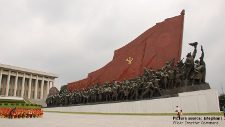North Korean Women as New Economic Agents: Drivers and Consequences

Sung Kyung Kim
Abstract
This Issue Brief explores the changing social and economic role of women in North Korea since the so-called Arduous March of the 1990s. With the breakdown of the public food distribution system and deteriorating economic conditions, many women have been forced to become breadwinners for their families. While this new-found economic agency carries the seeds of societal transformation in a traditionally patriarchal system, women have borne a disproportionate burden in securing not only their families’ survival, but also arguably that of the North Korean economy.
The Center would like to acknowledge that this publication was generously supported by the Korea Foundation.
Related Publications
-
Understanding North Korea’s Resilience through Economy, Laws and Governance: a review of introductory sources and essential monographs
This article reviews contributions that may help researchers re-evaluate the question of the North Korea’s remarkable resilience in spite of its undeniable economic failure, a seemingly obscure legal system, and […]
-
Anticipating North Korea’s Next Nuclear Test
This issue brief provides a comprehensive analysis of the anticipated technical and strategic objectives behind North Korea’s potential seventh nuclear test, along with an examination of the probable timing for […]
-
ISDP Annual Report 2023
ISDP’s Annual Report for the year 2023. We look back on 2023, a year in which tensions and conflicts captured the strategic space in ISDP’s focus areas, making headlines around […]
-
South Korea’s Indo-Pacific Strategy, Atmanirbhar Bharat, and the IPEF: Convergence and Commonality
For some time now, the existing multilateral networks such as those of the United Nations (UN) system have been largely ineffective in providing good global governance and helping create resilience, […]
-
Risk Reduction and Crisis Management on the Korean Peninsula
The situation on the Korean Peninsula is inherently intertwined with the growing instability of the East Asian security environment, where high tensions significantly increase the risk of unintended incidents and armed […]




